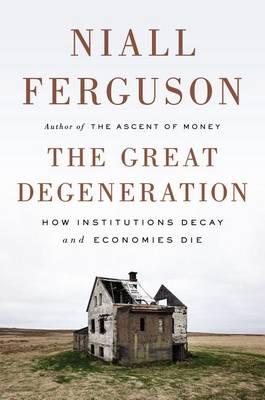A summer of big ideas: This post is the first in a series that will explore big ideas you should know about -- from the degeneration of institutions to 3D printing -- join me each week to learn something new and for a millennial take on the latest ideas generating buzz.
In the Fall of 2011, Niall Ferguson, a Professor at Harvard University, detailed for a TED audience what he believed to be the "6 killer apps for prosperity." Among them: science, competition, property rights, modern medicine, a consumer society, and the protestant work ethic. Ferguson likened these institutions to apps and argued that they had become open-source and as such were now easily downloadable by nations that had before lagged behind. Not unlike his fellow scholars, he predicted that this would lead to the "rise of the rest." Well now he's back, this time with a new book, a product of the Reith Lectures he presented at Oxford last year.

The Argument
In an interview last week about his book The Great Degeneration, Ferguson went back to his analogy of the apps. He framed the central argument of his newest book for me this way: you could say we've gotten to deleting some of those apps -- those institutions -- that made us. Or at the very least those apps are in need of an update.
It's a compelling idea if not a tad alarming. Ferguson argues that overregulation, messy fiscal policy, and a lack of torte reform makes for an America on the brink of institutional decay. But beyond these three ailments, Ferguson also notes another problem in our society, one that unfortunately seems to have not made the list of talking points he by and large stuck to in his interviews promoting the book last week. That problem is what Ferguson identified in his fourth Reith lecture as a decrease in the "associational vitality" of America, a reference to the kinds of voluntary associations identified and lauded by Frenchman Alexis de Toqueville as the lifeblood of our civil society.
Drawing issue with his Harvard colleague Robert Putnam's assessment that this decline in civil society can be attributed to technology, Ferguson offered a different explanation. Arguing, "I doubt very much that online communities are a substitute for traditional forms of association," Ferguson placed the blame instead on an overbearing state that created little incentive for civic engagement and service and instead encouraged dependency. But this seems to be a bit of a jump in logic. The state does not excessively regulate civil society, it does not tell us what organizations to join or if to join any at all. Our membership in civil society is as Toqueville said voluntary. If civil society is in decline, the onus surely is rightly placed on us, the citizens, not the state.
Identifying and arguing the cause of this purported decline in civil society is outside the scope of this column. But the larger question is still one worth noting: if it is in fact in decline, how do we make a more robust civil society? When asked this very question during a Q&A session after his last Reith lecture, Ferguson did not offer a conclusive answer. His prescription after all is institutional. The institutional reforms he prescribes in place, he seemed to imply that civil society would rebound once again.
A Milennial Take
The kind of fiscal reforms Ferguson is calling for are not exactly the ones on millennials' minds. Ferguson is not foolish; he knows that. Still, his nod to "generation" in the title of his latest book was not by accident. Lamenting that "the losers are the young," Ferguson pressed two pieces of advice in particular: "Young people should a) be looking for global opportunities and not assuming that this [America] is the best bet and b) should be pressing for these reforms."
A conservative who supported Mitt Romney during the 2012 presidential election, he also noted that, to his view at least, "young people have a bit of an issue of political consciousness... young people assume they should be Democrats." But he says millennials need to take a closer look at who's offering the radical fiscal reforms, regulatory fixes, and educational offerings he thinks we need. Ferguson argues that the Democratic Party "surely isn't providing [these]." But here he fails to admit something: millennials aren't convinced the Conservatives are either.
In the interim--or at least till 2016--Ferguson would advise millenials to explore their options outside the Western world or, as he told me, "Let me put it this way, my 19 year old son is in Hong Kong this summer."